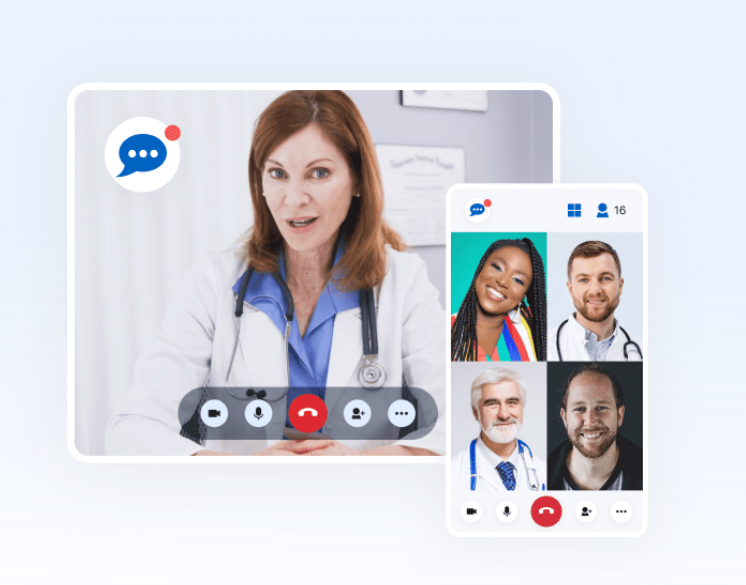Telemedicine has revolutionized healthcare delivery by bridging the gap between patients and providers through digital communication tools. The global healthcare ecosystem has witnessed rapid adoption of telemedicine solutions, especially accelerated by the COVID-19 pandemic, which highlighted the critical need for remote medical consultations. However, as the demand for telemedicine grows, so do patient expectations for seamless, personalized, and efficient care.
To meet these challenges, healthcare providers and technology companies are increasingly integrating Artificial Intelligence (AI) and chatbots into telemedicine platforms. These advanced technologies bring unprecedented capabilities to remote healthcare by automating routine processes, improving patient engagement, and enabling data-driven decision-making.
This article explores how AI and chatbots enhance telemedicine solutions, transforming patient care, and outlines key benefits, challenges, and future trends. If you are considering developing or upgrading your telemedicine platform, exploring telemedicine software development services can help you leverage these innovations effectively.
The Role of Telemedicine in Modern Healthcare
Before diving into AI and chatbots, it’s essential to understand telemedicine’s core value. Telemedicine enables patients to consult healthcare professionals remotely via video calls, mobile apps, or web portals. This model increases access to care, especially in underserved or rural areas, reduces travel time, and lowers the risk of infectious disease transmission.
However, telemedicine platforms face some inherent challenges:
- High volume of patient inquiries and follow-ups
- Limited healthcare workforce to handle all patient interactions promptly
- The need for accurate patient data collection before consultations
- Patient engagement and adherence to treatment plans
Integrating AI and chatbots can address many of these challenges, optimizing the telemedicine experience for both patients and providers.
Understanding AI and Chatbots in Telemedicine
Artificial Intelligence (AI) in Telemedicine
AI refers to computer systems designed to simulate human intelligence processes such as learning, reasoning, problem-solving, and decision-making. In healthcare, AI algorithms analyze vast datasets—like electronic health records (EHRs), medical imaging, and patient monitoring data—to provide diagnostic support, predict disease progression, and personalize treatments.
Chatbots in Telemedicine
Chatbots are AI-powered virtual assistants that interact with users through natural language processing (NLP). In telemedicine, chatbots can communicate with patients via text or voice on websites, mobile apps, or messaging platforms. They automate routine tasks like appointment scheduling, symptom checking, medication reminders, and answering FAQs.
Together, AI and chatbots form a powerful combination that enhances telemedicine by automating administrative workflows, providing real-time patient support, and enabling more efficient clinical decision-making.
Key Benefits of Integrating AI and Chatbots in Telemedicine Solutions
1. Streamlined Patient Triage and Symptom Checking
One of the most time-consuming processes in telemedicine is patient triage—evaluating the urgency and nature of a patient’s symptoms to determine the next steps. AI-powered symptom checkers and chatbots can perform initial assessments by asking patients structured questions about their health status.
These tools analyze responses against vast medical knowledge bases to provide recommendations, such as whether the patient should schedule a virtual visit, seek emergency care, or manage symptoms at home. This streamlines workflows, allowing healthcare providers to prioritize critical cases and reduce wait times.
2. 24/7 Patient Engagement and Support
Patients often have questions or health concerns outside typical clinic hours. Chatbots integrated into telemedicine platforms can provide round-the-clock assistance, answering FAQs about medications, treatments, or test preparations. This constant availability improves patient satisfaction and reduces the burden on human staff.
Moreover, chatbots can send automated reminders for medication, appointments, and follow-up care, helping patients stay on track with their treatment plans and improving health outcomes.
3. Personalized Patient Care Through AI Analytics
AI algorithms can analyze patient data to deliver personalized care recommendations. By integrating AI with telemedicine platforms, healthcare providers can receive insights into patient risk factors, treatment responses, and potential complications.
For example, AI can analyze historical data to predict which patients are at higher risk for hospital readmission or complications and suggest proactive interventions. This predictive capability leads to more targeted, efficient care and reduces healthcare costs.
4. Enhanced Clinical Decision Support
AI assists physicians during teleconsultations by providing real-time clinical decision support. AI can flag abnormal vital signs, suggest differential diagnoses, or recommend evidence-based treatment guidelines based on patient inputs and medical histories.
This support reduces diagnostic errors and helps clinicians make informed decisions, even in fast-paced virtual environments.
5. Automation of Administrative Tasks
Telemedicine platforms require handling appointment scheduling, patient registration, insurance verification, and billing. Chatbots can automate these administrative tasks, minimizing paperwork and freeing staff to focus on patient care.
Automation also reduces errors and delays caused by manual processing, enhancing operational efficiency.
6. Data Collection and Integration
Accurate and comprehensive patient data is critical for effective telemedicine. AI-enabled chatbots can guide patients through structured data collection forms, ensuring completeness and clarity of information.
This collected data integrates with electronic health records (EHRs) and other clinical systems, providing providers with up-to-date patient information for better care coordination.
Challenges and Considerations
Despite the benefits, integrating AI and chatbots into telemedicine solutions presents some challenges:
1. Data Privacy and Security
Healthcare data is highly sensitive and subject to strict regulations like HIPAA (USA) and GDPR (Europe). Telemedicine platforms integrating AI and chatbots must ensure robust data encryption, secure storage, and strict access controls to protect patient information.
2. Accuracy and Reliability of AI Systems
AI models depend on the quality and diversity of training data. Biased or incomplete data can lead to inaccurate symptom assessments or recommendations, potentially harming patients. Continuous validation and updating of AI algorithms are essential to maintain reliability.
3. User Experience and Accessibility
Patients vary in their digital literacy and access to technology. Chatbots and AI interfaces must be user-friendly, intuitive, and accessible to people with disabilities or language barriers to ensure equitable care.
4. Integration with Existing Healthcare Infrastructure
Many healthcare providers use legacy systems for patient records and billing. Integrating AI and chatbot functionalities seamlessly with existing infrastructure requires careful planning and skilled development—services offered by experienced telemedicine software development services providers.
5. Ethical and Legal Implications
Decisions made by AI in healthcare can have profound consequences. Establishing clear guidelines on AI usage, accountability, and transparency is vital to ensure ethical telemedicine practice.
Best Practices for Integrating AI and Chatbots in Telemedicine Solutions
1. Start with Clear Use Cases
Identify key areas where AI and chatbots can add value—such as triage, scheduling, or medication adherence—and focus development on those functionalities to ensure measurable impact.
2. Collaborate with Healthcare Experts
AI models must be designed with clinical input to ensure medical accuracy and relevance. Collaboration between software developers, clinicians, and regulatory experts is crucial.
3. Prioritize Patient Data Privacy
Implement stringent security protocols from the design phase. Ensure compliance with regional healthcare regulations and maintain transparency with patients on data usage.
4. Employ Natural Language Processing (NLP) Technologies
Advanced NLP enables chatbots to understand and respond to patient inputs in a conversational, human-like manner, improving engagement and trust.
5. Continuously Train and Improve AI Models
Use ongoing patient interaction data (with consent) to retrain and enhance AI algorithms, improving accuracy and adaptability over time.
6. Test and Optimize User Experience
Conduct usability testing with diverse patient groups to refine chatbot dialogues and AI interfaces for maximum accessibility and ease of use.
Future Trends in AI and Chatbots for Telemedicine
- Integration of Voice Assistants
Voice-enabled AI assistants will provide hands-free interaction options for telemedicine, beneficial for elderly or physically challenged patients.
- Use of AI for Remote Monitoring
AI will increasingly analyze data from wearable devices and home health sensors to provide continuous remote patient monitoring and early warning alerts.
- AI-Driven Mental Health Support
Chatbots trained in cognitive behavioral therapy (CBT) and emotional support will expand telepsychiatry services, offering scalable mental health care.
- Enhanced Multilingual Support
AI-powered chatbots will support multiple languages and cultural contexts, expanding telemedicine’s reach globally.
- Blockchain for Secure Data Sharing
Combining AI with blockchain technology may enhance secure data sharing and interoperability among telemedicine providers.
Conclusion
The integration of AI and chatbots into telemedicine solutions marks a significant step forward in enhancing patient care. These technologies streamline workflows, increase patient engagement, enable personalized medicine, and optimize healthcare resources. However, their successful implementation requires careful attention to privacy, accuracy, usability, and ethical standards.
For healthcare organizations aiming to leverage these transformative tools, partnering with expert telemedicine software development services providers is essential. They can design and implement tailored AI-powered telemedicine platforms that meet clinical needs and regulatory requirements, ensuring patients receive the best possible care remotely.

